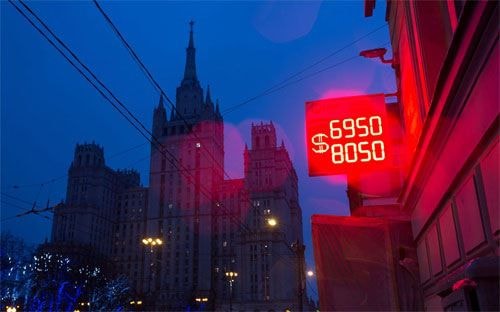Russia unexpectedly lowers interest rates, Ruble depreciates sharply again
The Russian Central Bank unexpectedly cut its key interest rate yesterday (January 30) amid growing concerns about the risk of recession in the country due to falling oil prices and Western sanctions imposed on Russia related to the crisis in Ukraine.
 |
| Before the Russian Central Bank's move to lower interest rates, the market hardly anticipated that the Ruble interest rate would soon be brought to a lower level - Photo: Bloomberg. |
The Ruble fell sharply after this move.
According to Reuters, the Russian Central Bank has cut interest rates by 2 percentage points to 15%. More than a month ago, this agency also surprised by raising interest rates from 6.5% to 17% to prevent the ruble exchange rate from falling.
Before the Russian Central Bank's rate cut, the market hardly anticipated that the ruble interest rate would soon be brought to a lower level.
Immediately after the announcement of the interest rate cut, the Ruble exchange rate fell more than 4% against the USD, reaching nearly 72 Rubles to 1 USD, the lowest in 1.5 months. In mid-December last year, the Ruble had fallen to an all-time low of more than 80 Rubles to 1 USD.
Observers say the move by the Russian Central Bank shows a shift in priority from fighting inflation and protecting the exchange rate to supporting economic activity. The agency predicts that Russia's economic activity will decline sharply in the coming months.
The move has also fueled speculation that recent changes in senior personnel at the Russian Central Bank have led to a softer monetary policy, possibly due to pressure from the Kremlin and lobbying by banks and businesses.
“Today’s decision to cut the key rate by 2 basis points is aimed at balancing the goals of fighting inflation and restoring growth,” Central Bank Governor Elvira Nabiullina said in a statement. Ms. Nabiullina also said that the ruble interest rate remains high enough for Russia to achieve its inflation target in the medium term.
President Vladimir Putin did not comment on the move by the Russian Central Bank. The Kremlin denied influencing the decision.
However, Russian Finance Minister Anton Siluanov said he supported the rate cut. According to Mr. Siluanov, the Central Bank of Russia has good reasons to believe that the currency market is under control.
“The decision to cut interest rates seems to be politically motivated, as it is a move that shows the Russian central bank is concerned about risks in the banking sector. It seems that the Russian central bank was forced to do so,” said Nicholas Spiro, managing director of Spiro Sovereign Strategy in London.
Earlier this month, Ksenia Yudayeva, head of the Russian Central Bank’s monetary policy department, was replaced by Dmitry Tulin, a hardliner on inflation, while Tulin has been a vocal advocate of lower interest rates.
The unexpected policy shift may also reflect that Russia is realizing that its economy is at risk of a hard landing as oil prices remain low and the situation in Ukraine continues to develop complicatedly.
Newly released data shows that real wages in Russia fell by 4.7% in December compared to the same period last year, while real disposable income fell by 7.3%. These figures bode poorly for the Russian economy in the coming months.
Russia's Central Bank forecasts GDP will fall 3.2% in the first half of 2015, after growing 0.6% in 2014.
The agency said that Russia's inflation could decline in the medium term, but implicitly acknowledged that inflation would remain in double digits this year, forecasting that inflation would fall below 10% in February 2014. Russia's inflation is currently at 13.2%, down from 11.4% in December last year.
According to VnEconomy
| RELATED NEWS |
|---|






